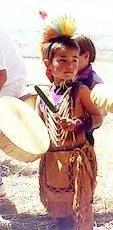|
|
Canku Ota |
|
|
(Many Paths) |
||
|
An Online Newsletter Celebrating Native America |
||
|
March 24, 2001 - Issue 32 |
||
|
|
||
|
Tribes' Focus Targets Youth |
||
|
by Mike Federman of the East Oregonian |
||
 Improving the
academic performance of Native American students while reducing their school dropout and truancy rates are the
goals of a new plan implemented by the Confederated Tribes of the Umatilla Indian Reservation. Improving the
academic performance of Native American students while reducing their school dropout and truancy rates are the
goals of a new plan implemented by the Confederated Tribes of the Umatilla Indian Reservation.Educating its youth is considered the most important issue facing the tribes today. "I think it’s safe to say we can call this a tribal blitz," said Lloyd Commander, director of the tribal Department of Education. The Youth Services Task Force 2001 Work Plan was approved by the Board of Trustees in February and outlines multi-departmental strategies for reaching an ambitious goal: The high school graduation rate of Native American children in Umatilla County school districts will be 98 percent by 2005. "It’s the right time for change," Commander said. "We're trying to be more accountable to our community. We’re counting on this for our future." The work plan is the result of several years of development. Truancy and the dropout rate have been a focus of tribal leaders and improvements in those areas already have been made. Three years ago, the Native American dropout rate at Pendleton High School was 44 percent. Last year, that number was down to 28 percent. The number of children identified as truant by tribal court last year was 120. This year, that number has dropped to 45. With implementation of the new work plan, the tribes expect those numbers to drop significantly. For that to happen, the tribes are taking a reservation-wide approach to improving education opportunities for its youth by making all tribal resources available to them. The tribes strengthened its education work force recently by hiring a truancy coordinator, a career education counselor and a family intervention counselor. A federal grant is funding a new tribal counselor for the Athena-Weston and Pilot Rock school districts. "We’re hitting this pretty hard," Commander said. "We’re still filling positions and filling gaps in service." One of the key elements to improving truancy is early intervention, he said. Parents of students who are habitually truant are notified of the situation and are paid a home visit by tribal staff. "We meet with parents and ask them: 'How can we help?'" Commander said. "Some families need special assistance and some families we need to prod." Parents who refuse to take responsibility for their children’s education can be fined by tribal court. The Youth Services Task Force also is considering a recommendation to withhold tribal dividend checks of students who are truant or show poor academic performance when support services are used. But Commander noted that dividends would be withheld only until a student shows improvement. The tribes provide monetary incentives for students who raise their GPAs or improve their school attendance. "We want people to know that we’re not an extension of the court," Commander said. "We're here to provide an education." The tribes monitor student progress to identify special needs students early in their education. That process starts with tribal Head Start and continues into later years by assisting students and advocating for them in schools during development of individual education plans. A goals-oriented "memorandum of understanding" with the Pendleton School District gives both entities better lines of communication and expanded resources to help students who are not successful in a traditional school setting. But the ultimate success of the tribes' education blitz will manifest itself as a tradition of diversely-educated tribal members who will maintain a high quality of government and community by offering their expertise to the reservation. To reach that goal, staff, students and their parents will be held accountable for educating tribal youth, Commander said. "For them to step into our shoes one day," he said, "they and their families will have to step up." |
|
Confederated Tribes of the Umatilla |
|
|
||
|
|
||
| Canku Ota is a free Newsletter celebrating Native America, its traditions and accomplishments . We do not provide subscriber or visitor names to anyone. Some articles presented in Canku Ota may contain copyright material. We have received appropriate permissions for republishing any articles. Material appearing here is distributed without profit or monetary gain to those who have expressed an interest. This is in accordance with Title 17 U.S.C. section 107. | ||
|
Canku Ota is a copyright © 2000, 2001 of Vicki Lockard and Paul Barry. |
||
|
|
The "Canku Ota - A Newsletter Celebrating Native America" web site and its design is the |
|
|
Copyright © 1999, 2000, 2001 of Paul C. Barry. |
||
|
All Rights Reserved. |
